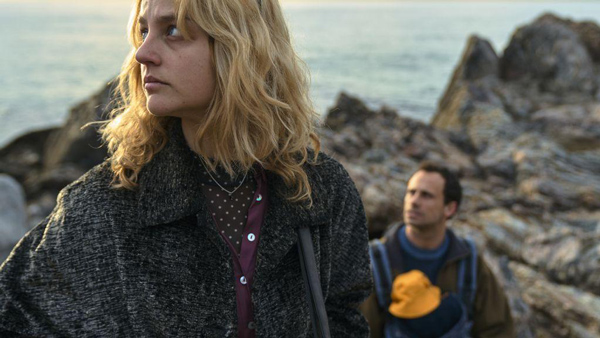The Good Mother: Coll Examines Motherhood as Psychological Trauma
 Seeing as director Mar Coll punctuates her third feature Salve Maria with chapters utilizing quotes from iconic feminist writers and literary figures, the absent specter of Gloria Steinem might come to mind, particularly her quote on ‘motherhood’ being a verb, a role one’s gender doesn’t necessitate either the demand or success of. Adapted from the 2018 novel Mother’s Don’t by Katixa Agirre, Coll’s latest actually conjures a sentiment reflected in the title of her last feature, 2013’s We All Want What’s Best For Her, which is also about a woman grappling with an unraveling after a tragic event. The circumstances plaguing the eponymous Maria (though the title actually forebodingly translates to Hail Mary) are more taboo in its grappling with a woman coming to terms with the reality she does not want to be a mother, and how the world around her conveniently ignores this reality.
Seeing as director Mar Coll punctuates her third feature Salve Maria with chapters utilizing quotes from iconic feminist writers and literary figures, the absent specter of Gloria Steinem might come to mind, particularly her quote on ‘motherhood’ being a verb, a role one’s gender doesn’t necessitate either the demand or success of. Adapted from the 2018 novel Mother’s Don’t by Katixa Agirre, Coll’s latest actually conjures a sentiment reflected in the title of her last feature, 2013’s We All Want What’s Best For Her, which is also about a woman grappling with an unraveling after a tragic event. The circumstances plaguing the eponymous Maria (though the title actually forebodingly translates to Hail Mary) are more taboo in its grappling with a woman coming to terms with the reality she does not want to be a mother, and how the world around her conveniently ignores this reality.
Successful author Maria (Laura Wissmahr) has recently given birth to her son, Eric. But her life seems to have been put on hold, left alone with the child because her husband Nico (Oriol Pla) can’t put off important work projects in order to utilize his paternity leave. While Nico gently reminds her of their need to move to a larger apartment in Barcelona so they can accommodate having a child, Maria seems to want everything to stay the same, resisting such changes as a way to hold onto her own routine. When a local news story breaks about a Frenchwoman who drowned her twin infants (and, whose husband notably is staying by her side), Maria becomes obsessed with this woman, trying to understand what happened. Maria is not so much horrified but fearful of her similar desires, plagued by dreams of violently murdering her own child. A chance encounter with another mother, Ana (Giannina Fruttero), a fan of Maria’s writing, reveals a potential connection to the Frenchwoman. Soon, Maria becomes fixated on speaking with the foreign murderer, leading her family to a pivotal reckoning.

The issue at the heart of Salve Maria is still, unfortunately, a taboo subject—-a mother who, instead of feeling unconditional love for her child, nurses resentment and anger. The emotions and actions of Weissmahr’s Maria play like the prologue to something like Alice Diop’s Saint Omer (2022), a court room drama about a woman standing trial for the murder of her infant child whilst being observed by another woman researching infanticide through the Medea myth (the infamous Euripides character also rears her head here as one of the chapter headings). Maria goes into a tailspin thanks, in part, to the media frenzy surrounding a foreigner who drowned her two children, and it’s clear Maria believes if she can find out the motive she can perhaps avoid a similar situation.
Coll builds tension quite astutely, with Weissmahr’s tight wound Maria exhibiting signs and symptoms which exemplify her feeling of entrapment. Some of the film’s more metaphorical moments, such as a crow scrabbling about in their apartment, tend to lean into more heavy-handed choices, which includes Oriol Pla (Jaime Rosales’ Petra, 2018) as a stridently oblivious husband who’s about as detached as any 1950s patriarchal cliche. But parental ambivalence abounds throughout, including a soundbite from the Frenchwoman’s mother, interviewed about her daughter’s infanticide. Speaking about the grandchildren she’d never met, she remarks “I have sense of the horror of this gesture,” but the gravity of the act hasn’t quite hit.
Weissmahr’s potency arrives in her painful resistance at nearly every turn. Ana, a woman who claims to be a fan, as well as a sterling example of motherhood incarnate, is gazed upon like some kind of insect, as if Maria was forced to downgrade herself to relate to this woman’s reality. Ana also proves to be a fortuitous scapegoat for Maria’s maddening plan to speak to the child murderer she fears she has a kinship with. And all along the way, a constantly ringing, vibrating phone confirms she’s opened the door to a new world without privacy or anonymity. Coll closes out her last chapter with a quote from Susan Suleiman, which fittingly ties together her themes on agency: “Mothers do not write – mothers are written.” But we leave Maria with the possibility of shaping her own destiny rather than the role prescribed for her.
Reviewed on August 10th at the 2024 Locarno Film Festival (77th edition) — Concorso Internazionale section. 111 Mins.
★★★/☆☆☆☆☆


